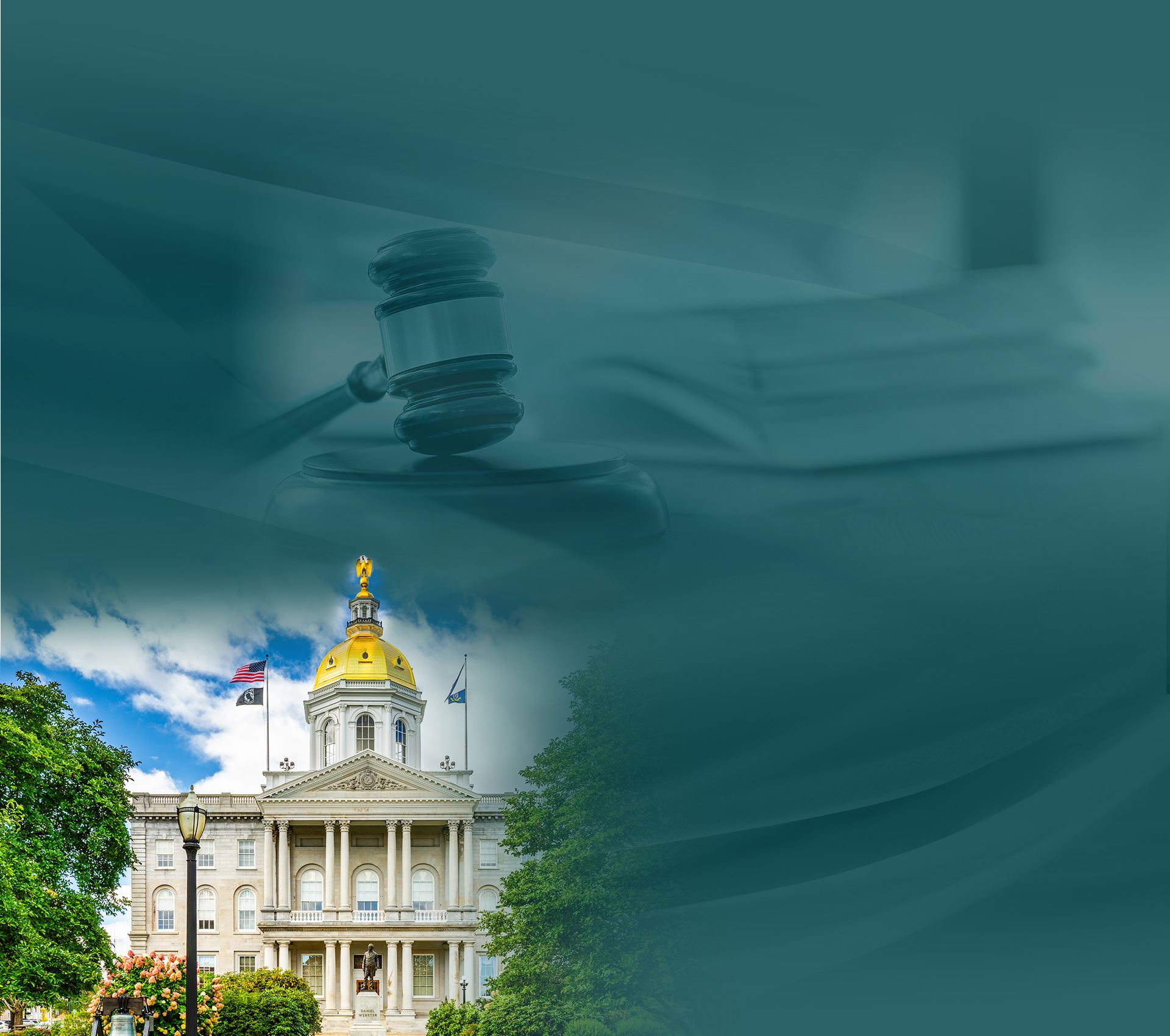
New Hampshire Motorcycle Accident Attorney
Your Rights After a Motorcycle Crash
Like any other motorist involved in an accident, motorcycle riders who are injured in crashes are often entitled to compensation for all of their injury-related expenses and damages. Because New Hampshire is an at-fault state when it comes to motor vehicle accident claims, you will need to prove that the other driver involved in the crash was negligent, reckless, or careless.
Proving a motorcycle accident claim can be a complicated legal process, which is why you should bring in a trusted personal injury lawyer who knows how to investigate the accident, uncover vital evidence, and build an effective case on your behalf.
Douglas, Leonard & Garvey, P.C. has been handling personal injury claims since 1997 and has a strong track record of success. As proven trial lawyers, we have the reputation and the leverage needed to provide compelling advocacy at the negotiation table or before a judge and jury. With over 140 years of collective legal experience, our team has the knowledge, resources, and skill to effectively advocate for you in the legal arena.
Injured in a motorcycle accident? Get experienced legal help from a New Hampshire motorcycle accident lawyer at Douglas, Leonard & Garvey, P.C. Call us at (603) 288-1403 or contact us online.
New Hampshire Motorcycle Laws
If you own or operate a motorcycle in New Hampshire, there are several important laws you should know. These laws are in place to protect the safety of motorcyclists, as well as others on the road. Always obey all applicable New Hampshire motorcycle laws and engage in defensive driving practices when sharing the road with fellow motorists.
Below, we have provided a brief outline of some important state laws regarding owning and operating motorcycles in New Hampshire:
- License Requirements: You must obtain a motorcycle endorsement to operate a motorcycle in the state of New Hampshire. Individuals between the ages of 16 and 18 must have a parental permission form and must pass a basic rider training course to apply. Applicants over the age of 18 must have a valid driver’s license and must complete a motorcycle rider training course or pass the motorcycle skills test at a local DMV.
- Helmet Laws: New Hampshire does not require motorcycle operators or passengers over the age of 18 to wear an approved motorcycle safety helmet. Motorcyclists and passengers under the age of 18 must wear motorcycle helmets by law, but anyone who rides a motorcycle should consider wearing a helmet, as this is one of the best ways to prevent severe injury, including traumatic brain injury, in the event of a crash.
- Minimum Insurance: In New Hampshire, you are not required to purchase insurance to operate a motorcycle unless specific circumstances apply. Insurance is compulsory due to some accidents and following a DUI conviction. However, it is strongly recommended that you purchase minimum liability insurance, as well as Medical Payments (MedPay) insurance, to protect yourself and others in the event of an accident.
- Eye Protection: While New Hampshire does not mandate that you wear a motorcycle helmet if you are over the age of 18, the state does require all motorcycle operators to wear approved protective eyewear, such as googles or a face shield. You are exempted from wearing protective eye gear if your motorcycle has an approved windshield that is effective at blocking wind and/or road debris.
- Riding and Road Rules: In New Hampshire, motorcyclists must keep both hands on the handlebars at all times while operating the vehicle. Motorcycles may only hold the number of passengers intended to ride, and passengers must have a seat and footrests. Passengers are prohibited from operating or interfering with motorcycle controls, including steering. Additionally, no more than two motorcyclists may ride side by side in a single lane, and “lane-splitting,” or the practice of riding between lanes of traffic, is not allowed anywhere in the state.
Note that these are just some of the many motorcycle-specific laws in New Hampshire. Before you ride, make sure you are properly licensed and have the appropriate gear. You should be aware of and abide by all applicable laws and safety practices to keep yourself—and others—free of injury.
Common Injuries from Motorcycle Accidents
Unfortunately, even the safest and most skilled of motorcyclists cannot always prevent an accident. When crashes occur, motorcycle riders are at risk of severe bodily injuries. This is because they have very little protection against the massive size and weight of other types of vehicles. As a result, motorcyclists are far more frequently injured and killed in these collisions than the occupants of passenger cars and trucks.
Some of the most common injuries associated with motorcycle accidents include:
- Accidental amputation/loss of limb
- Broken bones/fractures
- Back injuries, including herniated discs
- Cuts, scrapes, bruises, and lacerations
- Damage to internal organs
- Friction burns, or “road rash”
- Head and neck injuries
- Internal bleeding
- Skull fractures
- Spinal cord injuries
- Traumatic brain injuries
- Whiplash
Motorcycle accidents also commonly lead to severe emotional distress and debilitating mental health conditions, such as post-traumatic stress disorder (PTSD), anxiety, and depression. All of these injuries—and the costs associated with treating them and healing from them—can make it incredibly difficult for injured bikers to get back on their feet and move forward with their lives.
What Are the Most Common Causes of Motorcycle Accidents?
In many cases, motorcyclists are accused of causing accidents. This is because there is a common misconception that motorcyclists are inherently dangerous drivers who engage in unsafe and risky behaviors on the road. However, this is often blatantly untrue.
Many studies have shown that, in most motorcycle accidents, fault lies with the other driver—not the motorcyclist. One of the most common statements by motorists in these situations is that they failed to see the motorcyclist. While this may be true, since automobiles have blind spots in which a motorcyclist may be missed, it is not an excuse for failing to check for motorcycle riders.
Motorcycles are much smaller and thus less visible, but other motorists on the road have a duty to provide motorcyclists with the same care as any other person on the road. When they fail to do so, they can be held accountable for their negligence.
Human error and negligence are leading causes in most motorcycle accidents. Examples include:
- Inattention
- Distracted driving
- Texting or using a cell phone while driving
- Speeding
- Impaired driving from alcohol and/or drugs
- Failing to yield the right of way
- Breaking traffic laws
- Tailgating/following too closely
- Opening car doors in the path of an oncoming motorcyclist
- Failing to obey traffic signs, red lights, and other signals
In some cases, defective auto parts or poorly constructed roadways contribute to motorcycle accidents. When this happens, liable manufacturers, construction companies, contractors, and other parties could be held accountable.
Even if you shared some of the blame for the accident, you may still be entitled to damages if you were less than 51% at fault. Under New Hampshire’s modified comparative negligence rule, you would be able to recover a portion of your total damages limited up to the amount for which you are responsible. For example, if you were 25% at fault for the crash, you could still receive up to 75% of the total amount.
What to Do If You Were Involved in a Motorcycle Accident
What you do in the moments after an accident, as well as the days and weeks following the crash, can make a huge difference in the outcome of your case.
If you were involved in a motorcycle accident, try to do the following:
- Ensure the safety of those involved: Move away from the roadway and make sure others involved are safe from traffic hazards.
- Call 911: Be sure to give the police officer a full account of the accident. Ask the officer for the badge number and name so you can access the police report if necessary.
- Take photos and gather witness information: If possible, take photos of the scene and document the involved parties’ names and contact details. If there are any witnesses, try to collect their contact details as well.
- Seek medical care: An evaluation from a doctor will provide documentation and treatment of any injuries sustained. It will also ensure that you receive the care you need to begin the healing process.
- Refrain from speaking to the insurance company: If the other party’s insurance company reaches out to you after the accident, do not accept any settlements they offer. Instead, contact an attorney who can help ensure your rights are protected.
After a serious motorcycle accident, an experienced lawyer can immediately begin investigating the crash and determining who is liable for your damages. The sooner you contact our New Hampshire motorcycle accident attorneys, the sooner we can begin building your case. You should also know that you only have three years from the date of the accident (in most cases) to file your lawsuit. If you wait too long to bring a claim, you could lose your chance to recover compensation for your damages.
Why Hire a Motorcycle Accident Attorney?
Navigating the legal process after a serious accident or injury presents numerous challenges. Victims should focus on getting proper medical care and healing from their injuries; they should not have to deal with the insurance company or the stress of managing unexpected expenses due to their injuries. By putting an attorney on your side, you can feel confident knowing that a team of legal professionals is working on your case and fighting to maximize your recovery.
An attorney can handle time-sensitive documents, gather relevant evidence, and work with the insurance company so that you do not have to. Your legal team will also be able to prepare your case for litigation and, if necessary, represent you at trial.
Studies have shown that people who work with personal injury lawyers tend to recover faster, better settlements than those who try to navigate this process on their own. At Douglas, Leonard & Garvey, P.C., we believe that there is no substitute for experience when it comes to complex legal matters. With more than 140 collective years in practice, our attorneys have what it takes to fight for you.
For a free consultation with our New Hampshire motorcycle accident lawyer, call (603) 288-1403 or contact us online. You do not owe any attorney fees unless/until we recovery compensation for you.


Our Client Stories
-
"You are my hero!"
Our client recently wrote Attorney Ben King a lovely note: "Ben, Thank you for all your good work and counsel on behalf of my ...
- Ronald G. Wiesenthal -
"Best lawyer I ever could have asked for to represent me!"
Benjamin King was the best lawyer I ever could have asked for to represent me, because he was passionate and knowledgeable about fighting discrimination. He believed me and fought for me.
- Kate Frederick -
"Kevin Has Been Wonderful!"
I'm happy with the result and would recommend the firm to anyone in need of someone that will truly fight for them.
- Brandie Gonthier -
"The Law Firm that WINS for you, when other Law Firms can't, BEST of the BEST!!"
Whatever you do, hire this Law Office to fight for you and WIN. When other Law Offices tell you they will win, they don't, this Law Office and Ben King won a very intricate case.
- Tom C

Our Our Notable Victories
-
$1,500,000 YDC Claim
Maximum Settlement for YDC Abuse Victim through Private Claims Fund
-
$1,000,000 Auto Accident
Rear End Car Accident
-
$410,000 Workers' Compensation
-
$200,000 Slip & Fall